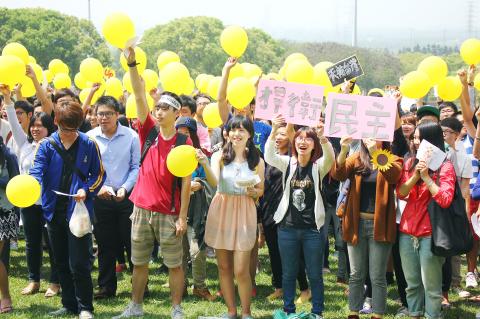A poll released yesterday found an overwhelming majority of respondents — 82.96 percent — are unhappy with the way the administration of President Ma Ying-jeou (馬英九) handled the Sunflower movement protests over the past three weeks.
The survey, conducted by the Chinese-language Liberty Times’ (the Taipei Times’ sister newspaper) polling center on Wednesday and Thursday nights, also found that a majority of respondents thought the student activism would deepen democracy in Taiwan.
The Sunflower movement became the name of the protesters who occupied the Legislative Yuan on March 18 to protest against the government’s handling of the cross-strait service trade agreement.

Photo: Lin Yi-chang, Taipei Times
The movement’s sit-in inside the legislature’s main chamber ended on Thursday evening when more than 100 protesters left the building.
When asked about the movement’s demands that a law governing oversight of cross-strait negotiations be passed before a review of the service trade pact is resumed, 74.19 percent of respondents agreed with the demand, 17.44 percent disagreed and 8.37 percent had no opinion, the poll found.
More than half of those polled — 58.32 percent — were against student protesters having to face legal action over their actions.
Of those surveyed, 34.28 percent favored the judiciary investigating the protesters, while 6.4 percent declined to comment.
Even among supporters of the Chinese Nationalist Party (KMT), the dissatisfaction rates were high.
Analysis showed that among those respondents who said they favored the KMT, 71.16 percent were not happy with the government’s handling of the Legislative Yuan protest, while 25 percent backed the administration.
Among those who said they supported the Democratic Progressive Party, 94.44 percent said that the government had mishandled the situation, while 3.47 percent said they were satisfied with the government’s reaction.
Among those respondents who said they were politically neutral, 82.47 percent did not agree with the government’s handling of the student-led opposition, while only 10.6 percent were in favor.
Comparing the Presidential Office’s response to the Wild Lilies student protest in 1990, when then-president Lee Teng-hui (李登輝) met with student representatives at his office and gave concrete answers to their demands, the poll found that respondents were unhappy with the Presidential Office’s initial criticism of the Sunflower movement and its subsequent sidestepping of the students’ demands.
The Liberty Times poll interviewed 1,015 people aged 20 or above through a random sampling of the last two digits of home telephone numbers nationwide.
The poll has a margin of error of 3.08 percentage points positive or negative and was completely funded by the Liberty Times.

CALL FOR SUPPORT: President William Lai called on lawmakers across party lines to ensure the livelihood of Taiwanese and that national security is protected President William Lai (賴清德) yesterday called for bipartisan support for Taiwan’s investment in self-defense capabilities at the christening and launch of two coast guard vessels at CSBC Corp, Taiwan’s (台灣國際造船) shipyard in Kaohsiung. The Taipei (台北) is the fourth and final ship of the Chiayi-class offshore patrol vessels, and the Siraya (西拉雅) is the Coast Guard Administration’s (CGA) first-ever ocean patrol vessel, the government said. The Taipei is the fourth and final ship of the Chiayi-class offshore patrol vessels with a displacement of about 4,000 tonnes, Lai said. This ship class was ordered as a result of former president Tsai Ing-wen’s (蔡英文) 2018

UKRAINE, NVIDIA: The US leader said the subject of Russia’s war had come up ‘very strongly,’ while Jenson Huang was hoping that the conversation was good Chinese President Xi Jinping (習近平) and US President Donald Trump had differing takes following their meeting in Busan, South Korea, yesterday. Xi said that the two sides should complete follow-up work as soon as possible to deliver tangible results that would provide “peace of mind” to China, the US and the rest of the world, while Trump hailed the “great success” of the talks. The two discussed trade, including a deal to reduce tariffs slapped on China for its role in the fentanyl trade, as well as cooperation in ending the war in Ukraine, among other issues, but they did not mention

HOTEL HIRING: An official said that hoteliers could begin hiring migrant workers next year, but must adhere to a rule requiring a NT$2,000 salary hike for Taiwanese The government is to allow the hospitality industry to recruit mid-level migrant workers for housekeeping and three other lines of work after the Executive Yuan yesterday approved a proposal by the Ministry of Labor. A shortage of workers at hotels and accommodation facilities was discussed at a meeting of the legislature’s Transportation Committee. A 2023 survey conducted by the Tourism Administration found that Taiwan’s lodging industry was short of about 6,600 housekeeping and cleaning workers, the agency said in a report to the committee. The shortage of workers in the industry is being studied, the report said. Hotel and Lodging Division Deputy Director Cheng

‘SECRETS’: While saying China would not attack during his presidency, Donald Trump declined to say how Washington would respond if Beijing were to take military action US President Donald Trump said that China would not take military action against Taiwan while he is president, as the Chinese leaders “know the consequences.” Trump made the statement during an interview on CBS’ 60 Minutes program that aired on Sunday, a few days after his meeting with Chinese President Xi Jinping (習近平) in South Korea. “He [Xi] has openly said, and his people have openly said at meetings, ‘we would never do anything while President Trump is president,’ because they know the consequences,” Trump said in the interview. However, he repeatedly declined to say exactly how Washington would respond in